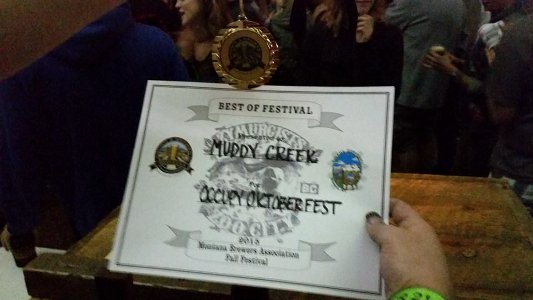We do that iijakii, our point of sale system tracks each pint and growler sold nightly and tabulates that into gallons and ultimately barrels.
We also track our barrels coming down from the taproom to cross-reference so we have something to double-check our figures and get a feel for taproom loss to over-pour and samples. (That's actually pretty significant as you'd imagine.)
At any rate, we have VERY good numbers on how much of each product we go through on a weekly and even daily basis. What is harder to predict just 6 months in is how our core customer base is going to react when we DO go offline with a product. So, say we take our Dirty Blonde of tap, which beer are they going to gravitate toward and spike on? The basic wheat? or the Belgian? Perhaps the Pale Ale? We're still trying to figure out how to predict these trends and frankly it's been hard.
What we've determined is that we want to set aside a few beers that will simply NEVER go off tap. The others we will commit to keeping on tap as "styles". We'll keep a wheat or hefe on tap but we aren't committed to a specific beer. We need a fruit beer on tap, but we have some leeway on what that is. We need An Amber or Red but not specifically No Paddle or An Ri Red...
This frees us up a bit, allows us to brew big batches of the core beers and 1/2 batches of the styles and mix and match them as we like. Hopefully we can cheat here and there. (IE, We have a fruited Pale Ale... That sounds like 2 birds, one stone to me!) I'm just sayin'.
Down the line if we find we actually get ahead, we have been invited (ya... "invited") by one of our local distributors to jump in on a limited contract. There is no minimum barrelage required. They distribute outside our local area so we can still self-distribute locally, and basically they are certain that they can sell our beer in markets outside our counties. Basically if we have an overage, it's a good way to make a bit of extra money and get our name out there. We just need to develop some labels and let them take a few kegs each month and see how it goes.
The risk of course is that it goes well. What if a restaurant or bar in Missoula Montana LOVES one of our products and says "We REALLY want more of that!" Then the distributor comes back and says, I know you guys only want to give us 6 kegs a month, but really, these guys will take 12, what do you say?
Well ****... now I have to put together an entire half batch just for this new account... doesn't sound like much does it? But it is. That's an entire day of labor, plus racking, plus keg cleaning and carbing and kegging. And that's just the start. Next month we get word that some OTHER restaurant wants more kegs. Then what?
Then we have stress. That's what. I suppose these are good problems to have. The issue is, we have one partner who wants to grow entirely too quickly and doesn't stop and think about the negative ramifications. The other 2 partners are much more conservative and want to nurture things along and focus on quality control and moderate growth. Unfortunately that means tough sledding financially. We make minimal profit and struggle to update equipment etc. like we want to.
Choices choices. Personally, I like brunettes.














































![Craft A Brew - Safale S-04 Dry Yeast - Fermentis - English Ale Dry Yeast - For English and American Ales and Hard Apple Ciders - Ingredients for Home Brewing - Beer Making Supplies - [1 Pack]](https://m.media-amazon.com/images/I/41fVGNh6JfL._SL500_.jpg)










